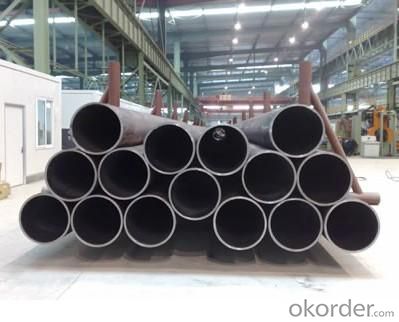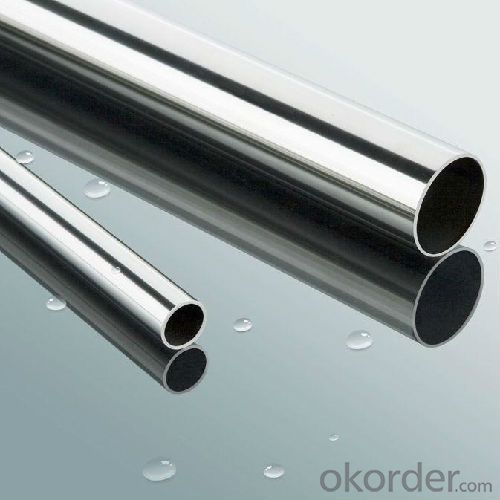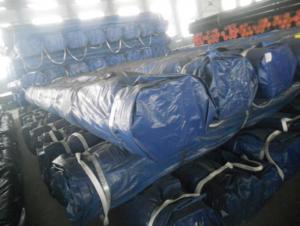2016 Prime Seamless Steel Pipe with PVC Packing
- Loading Port:
- Tianjin
- Payment Terms:
- TT or LC
- Min Order Qty:
- 30 m.t.
- Supply Capability:
- 5000 m.t./month
OKorder Service Pledge
OKorder Financial Service
You Might Also Like
1、Structure of Seamless Pipe:
Seamless pipe is made with steel bar by perforating machine. It holds a hollow section and there is no seam around. Resulting from the facture process, seamless pipes are of better pressure resistance than other molds, and was usually more easily available and safe than other pipes. We are factory and definitely will satisfy your demand.
2、Main Features of the Seamless Pipe:
• High working accuracy
• High strength
• Small inertia resistance
• Strong therming dissipine ability
• Good appearance
• Reasonble price
3、Seamless Pipe Specification:
Standard | GB, DIN, ASTM ASTM A106-2006, ASTM A53-2007 |
Grade | 10#-45#, 16Mn 10#, 20#, 45#, 16Mn |
Thickness | 8 - 33 mm |
Section Shape | Round |
Outer Diameter | 133 - 219 mm |
Place of Origin | Shandong, China (Mainland) |
Secondary Or Not | Non-secondary |
Application | Hydraulic Pipe |
Technique | Cold Drawn |
Certification | API |
Surface Treatment | factory state or painted black |
Special Pipe | API Pipe |
Alloy Or Not | Non-alloy |
Length | 5-12M |
Outer Diameter | 21.3-610mm |
Grade | 20#, 45#, Q345, API J55, API K55, API L80, API N80, API P110, A53B |
Standard | ASME, ASTM |
1) Material:20#(ASTM A 106/A53 GRB.API5LGRB,GB),45#,16Mn,10#.
2) Specification range: OD: 21.3-610mm, WT:6-70mm, length:6-12m or according to the requirement of clients.
3) Executive standards: GB, ASME API5L.ASTM A 106/A53,Despite of the above standards, we can also supply seamless steel pipe with standard of DIN, JIS, and so on, and also develop new products according to the requirements of our clients!
4) Surface: black lacquered, varnish coating or galvanized.
5) Ends: Beveled or square cut, plastic capped, painted.
6) Packing: bundles wrapped with strong steel strip, seaworthy packing.
4、Packaging & Delivery
Packaging Details: | seaworthy package, bundles wrapped with strong steel strip |
Delivery Detail: | 15-30days after received 30%TT |
5、FAQ of Seamless Pipe:
①How is the quality of your products?
We test on every pipe before delivery. You can get any quality certification or testing report from us. Our products are strictly in accordance with international standard. If products’ quality don’t accord to discription as we give or the promise before you place order, we promise 100% refund.
②How about the price?
Yes, we are factory and offering you the lowest price in the market. Speed and honesty are our target. No hesitate. if you like bargain and factory price is not low enough as you think, just don’t waste your time.Please trust the quotation we would give you, it is professional one.
③Why should you choose us?
Think of our quality and price. They are charming. SGS test / Customer inspection / Third party inspection is OK. We are factory. So we can make any pipe you need in accordance to your requirement. That's attaracting, right?
6、Seamless Pipe Images:


- Q:Can steel pipes be used for fire protection systems?
- Yes, steel pipes can be used for fire protection systems. Steel pipes are commonly used in fire sprinkler systems due to their durability, strength, and resistance to high temperatures. They are capable of withstanding the heat and pressure generated during a fire, making them suitable for fire protection applications. Additionally, steel pipes can be easily connected and installed, ensuring efficient and reliable fire suppression in buildings.
- Q:Are steel pipes suitable for desalination plants?
- Yes, steel pipes are suitable for desalination plants. Steel pipes offer several advantages that make them a suitable choice for desalination plants. Firstly, steel pipes are highly resistant to corrosion, which is crucial in desalination plants where the presence of saltwater can be highly corrosive. The corrosion resistance of steel pipes ensures the longevity and durability of the infrastructure, reducing maintenance and replacement costs. Secondly, steel pipes have high strength and can withstand high-pressure conditions, which are often required in desalination plants. The ability of steel pipes to handle high-pressure water flow without any deformations or leaks ensures the efficient and reliable operation of the desalination process. Furthermore, steel pipes have excellent heat resistance properties, making them suitable for desalination plants that often involve heat-intensive processes such as distillation or reverse osmosis. Steel pipes can withstand high temperatures without any structural damage, ensuring the safe and efficient transfer of heated water or steam. In addition, steel pipes are readily available and have a wide range of sizes and specifications, allowing for flexibility in design and construction of desalination plants. This availability and versatility make steel pipes a cost-effective choice for desalination projects. Overall, due to their corrosion resistance, high strength, heat resistance, availability, and cost-effectiveness, steel pipes are highly suitable for desalination plants and are widely used in the industry.
- Q:How do steel pipes compare to other types of piping materials?
- Steel pipes are widely considered to be one of the most durable and strong types of piping materials available. They offer superior strength, resistance to corrosion, and can withstand high pressure and extreme temperatures. Compared to other materials such as PVC or copper, steel pipes have a longer lifespan and are more suitable for heavy-duty applications. Additionally, steel pipes are highly recyclable, making them an environmentally friendly choice.
- Q:Are steel pipes suitable for underground gas distribution?
- Yes, steel pipes are suitable for underground gas distribution. Steel pipes are widely used in gas distribution systems due to their high strength, durability, and resistance to corrosion. They are able to withstand the pressure and stress of underground conditions, making them a reliable choice for transporting gas. Additionally, steel pipes have the advantage of being able to handle high temperatures and are resistant to fire, making them a safe option for underground gas distribution. However, it is important to ensure that the steel pipes used are properly coated and protected against corrosion to ensure their longevity and prevent any potential leaks or damage.
- Q:What are the different types of steel pipe connections?
- There are several types of steel pipe connections, including threaded connections, welded connections, flanged connections, grooved connections, and compression connections.
- Q:What are the different types of steel pipe coatings for underground gas pipelines?
- There are several types of steel pipe coatings used for underground gas pipelines, including fusion bonded epoxy (FBE) coating, three-layer polyethylene (3LPE) coating, and three-layer polypropylene (3LPP) coating. These coatings provide protection against corrosion, abrasion, and other external factors, ensuring the longevity and safety of the gas pipelines.
- Q:What is the difference between internal threading and external threading of steel pipes?
- The difference between internal threading and external threading of steel pipes lies in the location and method of threading. Internal threading refers to the process of creating threads on the inside surface of a steel pipe, allowing it to be connected to other components with external threads. On the other hand, external threading involves creating threads on the outside surface of a steel pipe, enabling it to be joined with components having internal threads. These two methods serve different purposes and are utilized depending on the specific requirements of the plumbing or assembly project.
- Q:What are the different methods of cleaning steel pipes?
- There are several methods of cleaning steel pipes, including mechanical cleaning, chemical cleaning, and high-pressure water jetting. Mechanical cleaning involves using wire brushes, scrapers, or sandpaper to physically remove debris and rust from the pipe's surface. Chemical cleaning involves using solvents or acids to dissolve contaminants and rust, followed by flushing the pipe with water. High-pressure water jetting uses a stream of water at high pressure to remove dirt, rust, and other deposits from the pipe's interior and exterior surfaces.
- Q:How are steel pipes used in the construction of wind farms?
- Steel pipes are used in the construction of wind farms for various purposes, such as supporting wind turbine towers, providing a strong foundation for the turbines, and transmitting electricity generated by the turbines to the power grid.
- Q:Can steel pipes be used for oil transportation?
- Yes, steel pipes are commonly used for oil transportation due to their high strength, durability, and resistance to corrosion.
1. Manufacturer Overview |
|
|---|---|
| Location | |
| Year Established | |
| Annual Output Value | |
| Main Markets | |
| Company Certifications | |
2. Manufacturer Certificates |
|
|---|---|
| a) Certification Name | |
| Range | |
| Reference | |
| Validity Period | |
3. Manufacturer Capability |
|
|---|---|
| a)Trade Capacity | |
| Nearest Port | |
| Export Percentage | |
| No.of Employees in Trade Department | |
| Language Spoken: | |
| b)Factory Information | |
| Factory Size: | |
| No. of Production Lines | |
| Contract Manufacturing | |
| Product Price Range | |
Send your message to us
2016 Prime Seamless Steel Pipe with PVC Packing
- Loading Port:
- Tianjin
- Payment Terms:
- TT or LC
- Min Order Qty:
- 30 m.t.
- Supply Capability:
- 5000 m.t./month
OKorder Service Pledge
OKorder Financial Service
Similar products
New products
Hot products
Related keywords






























